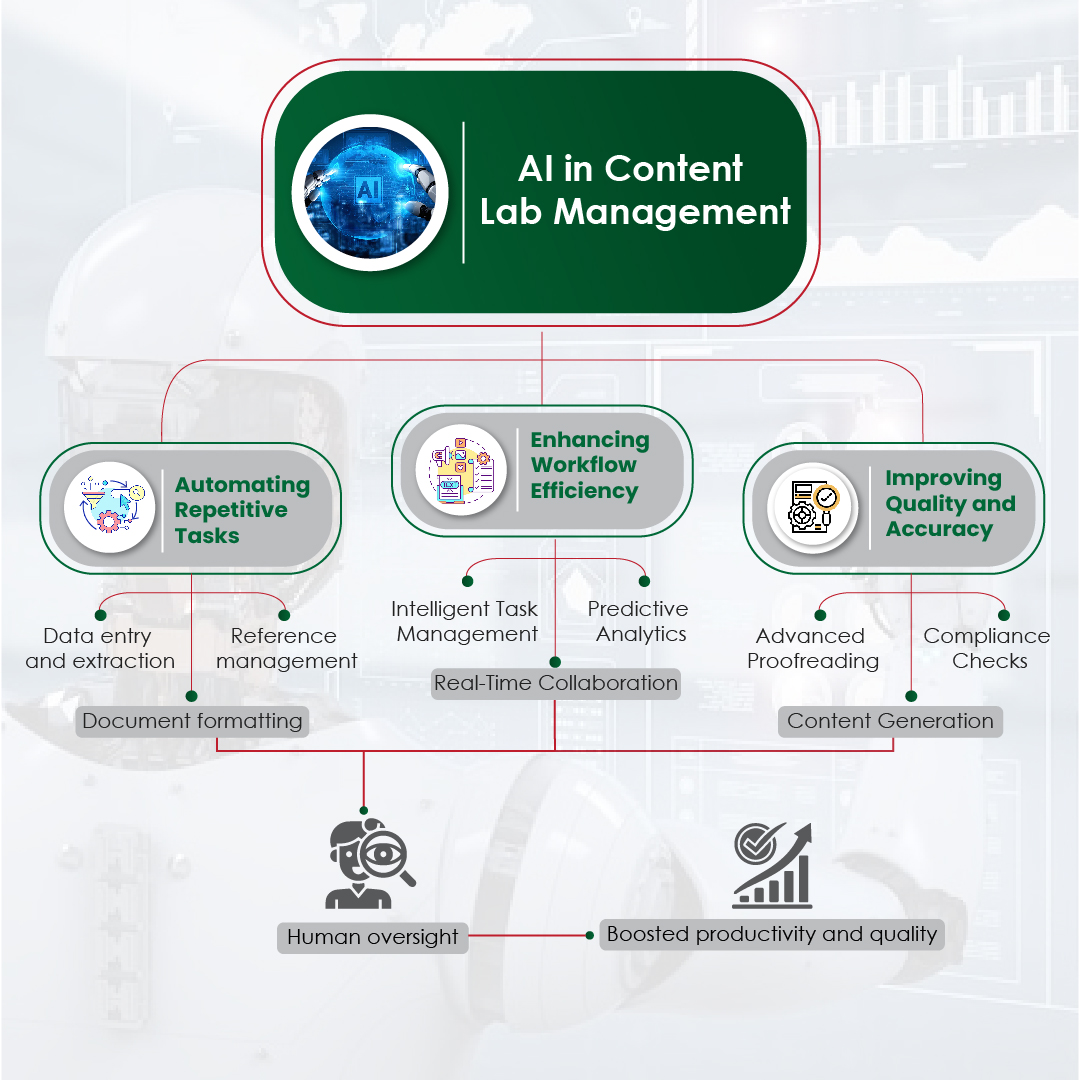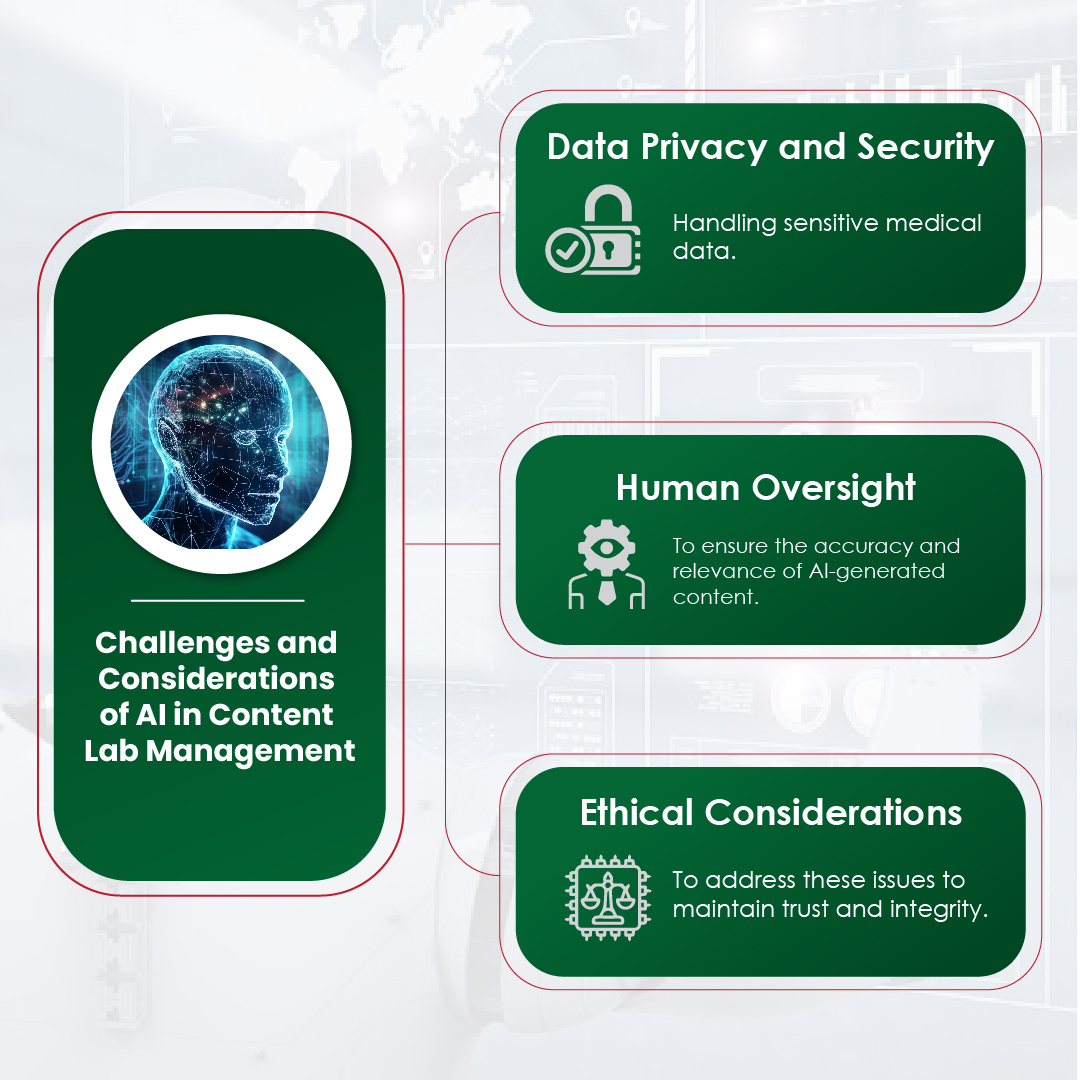In the dynamic field of medical communication, managing a content lab effectively is crucial to ensure the delivery of high-quality and timely outputs. As the demands for precise, accurate, and compliant medical documentation increase, so does the need for efficiency in handling these tasks. Enter Artificial Intelligence (AI) – a transformative technology revolutionizing content lab management by automating repetitive tasks and improving workflow efficiency. At Turacoz, we understand the growing need to integrate and accept AI in the workflow whilst ensuring no data is compromised.
Role of AI in Content Lab Management
AI, with its capabilities in machine learning, natural language processing (NLP), and data analytics, offers a myriad of solutions to the challenges faced by content labs. It can automate routine tasks, streamline workflows, and enhance the accuracy and quality of medical content. Here’s how AI-powered solutions are making a significant impact:
- Automating Repetitive Tasks
Repetitive tasks such as data entry, document formatting, and reference management are time-consuming and prone to human error. AI can automate these tasks, save valuable time for medical writers and editors to focus on more complex activities.
- Data Entry and Extraction: AI algorithms can automatically extract relevant data from clinical trial reports, research papers, and regulatory documents, and input it into predefined templates. This not only speeds up the process but also reduces the risk of errors.
- Document Formatting: Formatting documents according to specific guidelines can be tedious. AI tools can automate this process, ensuring that all documents adhere to the required standards and are consistent in style and structure.
- Reference Management: AI-powered reference management tools can automatically generate, format, and update citations and bibliographies, ensuring accuracy and compliance with journal or regulatory requirements.
- Enhancing Workflow Efficiency
AI can significantly enhance workflow efficiency by streamlining processes and improving collaboration among team members. This is achieved through intelligent task management, real-time collaboration tools, and predictive analytics.
- Intelligent Task Management: AI-driven project management tools can allocate tasks based on team members’ expertise, workload, and deadlines. They can also prioritize tasks and set reminders, ensuring that projects stay on track and deadlines are met.
- Real-Time Collaboration: AI-powered platforms enable seamless real-time collaboration among team members, regardless of their geographical location. These platforms can facilitate document sharing, version control, and instant feedback, improving the overall efficiency of the content creation process.
- Predictive Analytics: By analyzing historical data, AI can predict potential bottlenecks and suggest proactive measures to mitigate them. This helps in anticipating challenges and optimizing workflows to ensure smooth project execution.
- Improving Quality and Accuracy
Quality and accuracy are paramount in medical communication. AI can enhance these aspects through advanced proofreading, content generation, and compliance checks.
- Advanced Proofreading: AI-powered proofreading tools can detect grammatical errors, spelling mistakes, and inconsistencies in medical terminology. They can also suggest improvements in sentence structure and readability, ensuring that the content is clear, concise, and error-free.
- Content Generation: AI algorithms, particularly those based on NLP, can generate initial drafts of medical documents such as clinical trial reports, patient information leaflets, and regulatory submissions. These drafts can then be reviewed and refined by human experts, significantly reducing the time and effort required to create high-quality content.
- Compliance Checks: Ensuring compliance with regulatory guidelines and industry standards is critical in medical communication. AI tools can automatically check documents for compliance with specific guidelines, flagging any deviations and suggesting corrections. This reduces the risk of non-compliance and ensures that all documents meet the necessary standards.
Human Intervention: The critical component
While AI offers numerous benefits, human intervention remains crucial in AI-powered content lab management. AI can handle many aspects of data processing and initial content creation, but human oversight is essential for ensuring the accuracy, relevance, and quality of the output. Medical writers and editors bring expertise and critical thinking that AI cannot replicate. They review and refine AI-generated content, provide context-specific insights, and make judgment calls that require a deep understanding of the subject matter. This collaborative approach, where AI handles the heavy lifting and humans add the finishing touches, ensures that the final product is both technically sound and contextually appropriate.
Case Studies: AI in Action
Case Study 1: Streamlining Clinical Trial Reporting
A global pharmaceutical company implemented an AI-powered solution to streamline its clinical trial reporting process. The AI tool extracted data from clinical trial databases and automatically populated predefined templates for clinical study reports. This reduced the time required to generate these reports by 50%, allowing the company to accelerate its drug development timelines and bring new treatments to market faster.
Case Study 2: Enhancing Quality Control
A medical communication agency adopted an AI-driven proofreading tool to enhance the quality control of its publications. The tool identified and corrected errors in grammar, punctuation, and medical terminology, ensuring that all documents were of the highest quality. As a result, the agency saw a significant reduction in rework and an increase in client satisfaction.
Case Study 3: Improving Regulatory Submissions
A biotech firm leveraged AI for regulatory writing and compliance checks. The AI system reviewed regulatory documents for adherence to guidelines and flagged any non-compliant sections. This automated review process not only ensured compliance but also reduced the review time by 40%, allowing the firm to expedite its regulatory submissions.
The Future of AI in Content Lab Management
The integration of AI in content lab management is still in its early stages, but its potential is immense. As AI technology continues to evolve, we can expect even more advanced solutions that will further optimize workflows, enhance quality, and drive productivity.
- Emerging Trends:
- AI-Powered Content Personalization: AI will enable more personalized content creation, tailoring information to the specific needs and preferences of different audiences, such as healthcare professionals, patients, and regulatory authorities.
- Integration with Other Technologies: The combination of AI with other technologies like blockchain and the Internet of Things (IoT) will enhance data security, traceability, and real-time data sharing, further improving content lab management.
- Continuous Learning and Improvement: AI systems will continuously learn from new data and user feedback, becoming more accurate and efficient over time. This will lead to continuous improvement in the quality and efficiency of medical communication.
- Challenges and Considerations
While the benefits of AI are clear, there are also challenges and considerations to keep in mind:
- Data Privacy and Security: Handling sensitive medical data requires strict adherence to data privacy and security regulations. Ensuring that AI systems comply with these regulations is crucial.
- Human Oversight: Despite the capabilities of AI, human oversight is essential to ensure the accuracy and relevance of AI-generated content. Collaboration between AI and human experts will be key to achieving the best results.
- Ethical Considerations: The use of AI in medical communication raises ethical questions about transparency, accountability, and bias. It is important to address these issues to maintain trust and integrity in medical communication.
AI-powered content lab management is transforming the field of medical communication by automating repetitive tasks, enhancing workflow efficiency, and improving quality and accuracy. By leveraging AI, medical communication companies can boost productivity, ensure high-quality outputs, and meet the increasing demands of the industry. As AI technology continues to advance, its integration into content lab management will become even more impactful, driving innovation and excellence in medical communication.








































